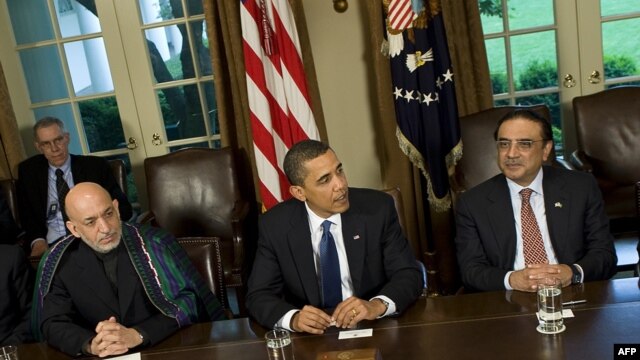Pakistan confirms 'facilitating' contacts with Afghan Taliban
| Publisher | Radio Free Europe/Radio Liberty |
| Publication Date | 20 June 2013 |
| Cite as | Radio Free Europe/Radio Liberty, Pakistan confirms 'facilitating' contacts with Afghan Taliban, 20 June 2013, available at: https://www.refworld.org/docid/51d6cafa31.html [accessed 20 May 2023] |
| Disclaimer | This is not a UNHCR publication. UNHCR is not responsible for, nor does it necessarily endorse, its content. Any views expressed are solely those of the author or publisher and do not necessarily reflect those of UNHCR, the United Nations or its Member States. |
Last updated (GMT/UTC): 20.06.2013 17:50
By RFE/RL's Radio Mashaal
 Afghan President Hamid Karzai, U.S. President Barack Obama, and Pakistani President Asif Ali Zardari (left to right) at a meeting at the White House in Washington (file photo)
Afghan President Hamid Karzai, U.S. President Barack Obama, and Pakistani President Asif Ali Zardari (left to right) at a meeting at the White House in Washington (file photo)
Pakistan's government has confirmed reports that it helped mediate contacts between the Taliban and the United States that are expected to lead to direct talks in Doha, Qatar.
Afghanistan's Taliban movement opened its first office in Doha on June 18 and announced its willingness to open peace talks with the U.S. government, sparking anger in Kabul over Afghan officials' exclusion from the process.
"We extended facilitation to the Doha process," Pakistani Foreign Ministry spokesman Aizaz Ahmed Chaudhry told a news conference in Islamabad on June 20. "We think that that process is part of the larger reconciliation process, which in turn will help bring an end to the war and bring lasting peace to Afghanistan."
Negotiations over the opening of the Taliban office lasted more than two years.
The development marked the first significant step toward a cease-fire in the 12-year-old armed conflict between Kabul and the insurgent group of hard-line Islamists.
Talks between U.S. officials and the Taliban were expected to begin on June 20, but appeared to have been delayed after Afghan President Hamid Karzai said he would not send Afghan representatives to Qatar unless the peace process was "Afghan-led."
James Dobbins, the U.S. special representative on Afghanistan and Pakistan, postponed his plans to go to Qatar.
U.S. Secretary of State John Kerry spoke by telephone with Karzai on June 19 in a bid to defuse the row.
U.S. Deputy Ambassador Rosemary DiCarlo told a UN Security Council meeting on Afghanistan the following day that the new Taliban office in Qatar must not be seen as an embassy.
Pakistan, for years, was a key backer of the Afghan Taliban, and militants have found shelter in Pakistan, despite Islamabad's repeatedly declared support for the battle against Islamist extremism.
Pakistani Foreign Ministry spokesman Chaudhry said that Islamabad also believes that peace negotiations must be conducted by Afghans, but added that all protagonists in the conflict should be involved.
"Our stance remains that it has to be an all inclusive intra-Afghan dialogue," Chaudhry said. "What's happening in Doha is a part of that reconciliation process. It is our hope and expectation that all stakeholders in Afghanistan will be part of that national reconciliation process."
The Taliban meanwhile said they are ready to exchange a U.S. soldier held captive since 2009 for five senior Taliban imprisoned at Guantanamo Bay.
Shaheen Suhail, spokesman at the Taliban's new Qatar office, said the prisoner exchange is the first item on the Taliban's agenda before opening talks in Qatar.
With reporting by Reuters and AP
Link to original story on RFE/RL website
